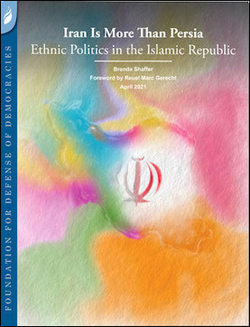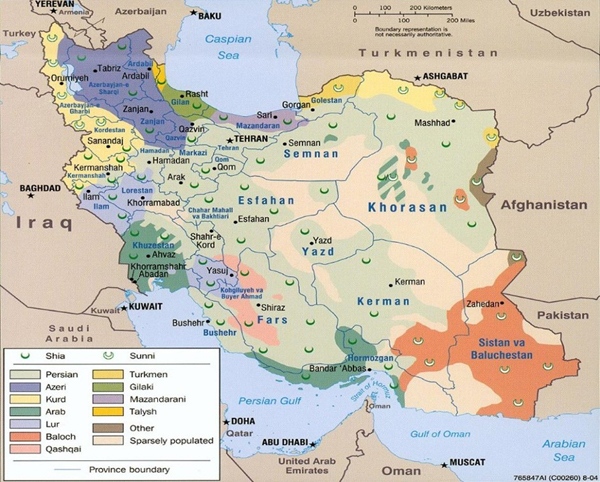 The enigmatic title means that Persian-speakers make up slightly less than half of Iran's population; more bluntly, Iran is not a country but an empire. If the great sea empires (British, French, Dutch, Portuguese, Spanish) nearly disappeared sixty years ago, the great land empires (with the exception of the Russian, mostly gone thirty years ago) live on, conveniently hiding under their contiguity: the Chinese, Ethiopian, Burmese, and Persian.
The enigmatic title means that Persian-speakers make up slightly less than half of Iran's population; more bluntly, Iran is not a country but an empire. If the great sea empires (British, French, Dutch, Portuguese, Spanish) nearly disappeared sixty years ago, the great land empires (with the exception of the Russian, mostly gone thirty years ago) live on, conveniently hiding under their contiguity: the Chinese, Ethiopian, Burmese, and Persian.
Shaffer provides a much-needed summary of the Persian Empire, laying out how, in all respects but power, Persians are a minority: geography, demographics, linguistics. Because they rule, however, Persian-speakers can discriminate in all the usual ways against the empire's minority peoples, including the Azerbaijanis, Kurds, Arabs, Lurs, Gilaks, Mazanis, Turkmans, and Baluch. They deploy negative stereotypes ("portraying Arabs as primitive and extremist and Azerbaijanis as stupid"), engage in environmental degradation, prohibit instruction in local languages, import allied forces from Lebanon and Iraq to quell disturbances, assassinate anti-regime expatriates, and encourage Persian-speakers to move into majority-minority regions. Just as in China, political activity to promote ethnic minority cultural and language rights is condemned as "separatism." To make matters worse, even the Persian-speaking opposition shares this outlook.
Discontented minorities complicate relations with many of Iran's neighbors, and especially those in which its minorities also live: Iraq, Turkey, Azerbaijan, Pakistan, Afghanistan. "The regime's future hold over Iran's ethnic minorities is far from guaranteed," Shaffer writes, and, ultimately, the minorities "could pose challenges for the stability of the Islamic Republic." Indeed, "[i]n an acute regime crisis, the ethnic factor could play a role in toppling the government."
Shaffer believes the war between Armenia and Azerbaijan "was a watershed moment" for Iran's largest minority. Which makes one wonder: the Soviet Union split into fifteen countries; when its day of reckoning comes, how many will Iran become?
 A 2004 CIA map of Iran's ethnic distribution. |
Sep. 1, 2021 addendum: I looked at the U.S. government's attempt to hide Iran's imperial reality at "Did the CIA Fiddle With Population Statistics about Iran?"
Oct. 18, 2024 update: Along the same lines, Himdad Mustafa writes today that "Regime Change In Iran Is Possible Only By Supporting Its Ethnic Minorities." He calls for the international community to
engage Iran more effectively inside its borders through pursuing a "periphery strategy," i.e., supporting the ethnic minorities found in its border regions. This will achieve two goals. First, ethnic minorities would finally enjoy the freedom and human rights of which they have been deprived since the early 20th century. Second, this would deprive Iran of human and natural resources it needs to perpetrate its malign expansionism in the Middle East.
June 19, 2025 update: Israel's crushing attack on Iranian sites has prompted new discussion of the minorities. For example, here is a Kurd, Pel Berwari, writing, "Want Real Regime Change In Iran? Support The Minorities First."
